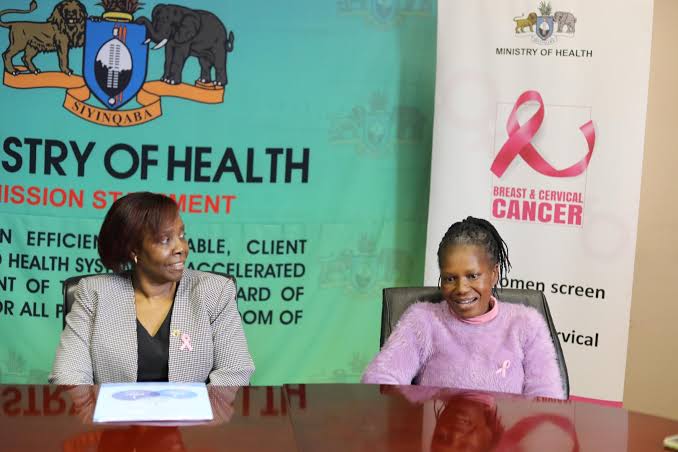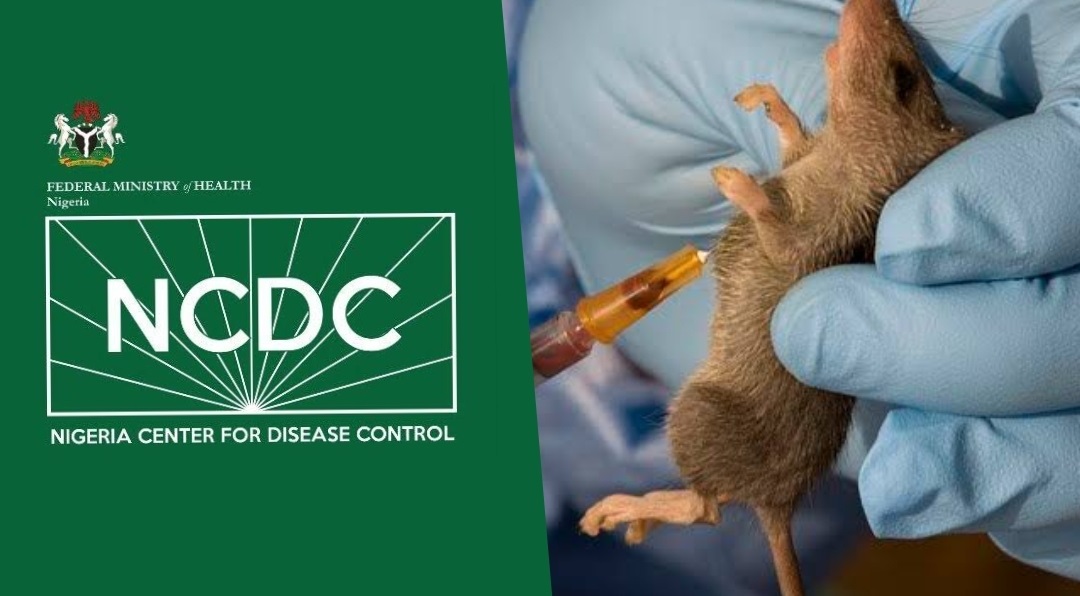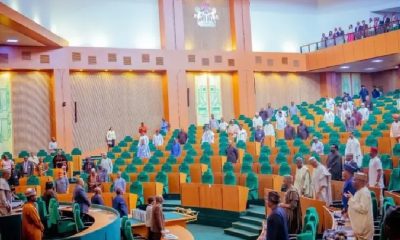Health
Breast cancer: Expert advocates health policy reform

By Francesca Hngeior.
A primary healthcare consultant, Dr Yewande Omikunle, has canvassed an improvement in breast cancer education in Nigeria.
Omikunle said a comprehensive health policy reform is one way to get this done.
Omikunle, who is the Director of Public Affairs at Sarah Ayoka Oduwaiye Foundation (SAOF Cancer Charity), said this in a statement on Tuesday to mark Breast Cancer Awareness Month, which is annually held in October.
She expressed concern that despite spreading breast cancer awareness, some communities in the country are not adequately informed.
She said, “We must know that numerous ethical issues apply to breast cancer and other chronic cancer diagnoses including informed consent; education of relatives, friends, and the public; patients’ comfort in the discussion of their diagnoses and treatment; access to care; and allocation of scarce resources.
“Breast cancer remains a formidable health challenge in Nigeria, where a significant number of women succumb to the disease, often diagnosed in its late stages.
“The lack of knowledge, deeply ingrained cultural and religious beliefs, and various barriers impede regular breast cancer screening, contributing to the alarming mortality rates among Nigerian women.”
As part of efforts to raise enlightenment, the consultant noted that the SAOF cancer charity embarked on public awareness by dispelling myths, providing factual information, and advocating increased access to affordable and convenient screening services across Nigeria.
She said, “Nigerian society must address these barriers collectively and ensure that every woman has the knowledge, resources, and support needed to detect breast cancer early.
“By fostering a culture of openness, education, and proactive healthcare, we can strive towards reducing the burden of breast cancer mortality and improving the quality of life for all Nigerian women.
“As Breast Cancer Awareness Month unfolds, let us unite in the fight against breast cancer, breaking down barriers, raising awareness, and advocating for early detection and access to quality care. There is a need for stronger government intervention and support to bolster existing initiatives and ensure that breast cancer education reaches every corner of Nigeria.”
Health
SAD! Lassa Fever Claims 127 Lives Across 18 States in Nigeria(List)

The Nigeria Centre for Disease Control and Prevention (NCDC) has reported a sharp rise in Lassa fever cases, with 127 deaths confirmed across 18 states as of April 6, 2025.
According to the agency’s latest situation report, 674 people have tested positive for the virus out of 4,025 suspected cases recorded between January and early April.
The current Case Fatality Rate (CFR) stands at 18.8%, slightly higher than the 18.5% recorded during the same period in 2024, indicating a worrying upward trend.
The most affected states include Taraba (31 deaths), Ondo (26), Edo (17), Bauchi (12), and Ebonyi (11). Other states with reported fatalities are Gombe (7), Kogi (4), Benue (4), Nasarawa (4), Plateau (5), Kaduna (2), and one death each in Enugu, Delta, Cross River, and Ogun.
The report also highlights that 71% of confirmed cases were concentrated in Ondo (30%), Bauchi (25%), and Edo (16%), with the remaining 29% spread across 15 other states. The virus has now reached 93 local government areas nationwide.
Lassa fever is a viral haemorrhagic illness transmitted mainly through exposure to food or household items contaminated by infected rodents, particularly the multimammate rat. It can also spread through direct contact with the blood, urine, feces, or other bodily secretions of an infected person.
The disease predominantly affects people between the ages of 21 and 30, with a male-to-female ratio of 1:0.8, according to NCDC data.
In response to the outbreak, the NCDC has activated the National Lassa Fever Multi-Partner, Multi-sectoral Incident Management System to strengthen surveillance, case management, risk communication, and coordination efforts at all levels.
As the country continues to battle the spread of the virus, the NCDC is urging citizens to maintain proper hygiene, store food in rodent-proof containers, and seek immediate medical attention if symptoms such as fever, headache, sore throat, chest pain, or vomiting occur
Health
FG identifies 1,277 persons for monitoring as Lassa fever kills 122

The Nigeria Centre for Disease Control and Prevention has listed 1,277 persons for follow-up over the possibility of being infected with Lassa fever. This follows the centre recording 659 confirmed cases out of 3,779 suspected cases and 122 deaths in 13 weeks (from January to March 30, 2025).
A report obtained from the NCDC on Friday indicated that no fewer than 18 states across the country have recorded Lassa fever cases, with Ondo, Bauchi, and Edo being the most affected.
The report partly reads, “Cumulatively, in week 13 of 2025, 122 deaths have been reported, with a Case Fatality Rate of 18.5%, which is lower than the CFR for the same period in 2024 (18.7%).
“In total for 2025, 18 states have recorded at least one confirmed case across 93 Local Government Areas. Seventy-one per cent of all confirmed Lassa fever cases were reported from these three states (Ondo, Bauchi, and Edo), while 29% were reported from 15 other states with confirmed Lassa fever cases. Of the 71% of confirmed cases, Ondo reported 30%, Bauchi 25%, and Edo 16%.
“The predominant age group affected is 21-30 years (Range: 1 to 94 years, Median Age: 30 years). The male-to-female ratio for confirmed cases is 1:0.8. The number of suspected cases increased compared to that reported for the same period in 2024. No new healthcare worker was affected in week 13. The National Lassa fever multi-partner, multi-sectoral Incident Management System (IMS) was activated to coordinate the response activities at all levels.”
The report shows that the contacts under follow-up number 1,277, while the contacts that have completed follow-up total 1,448.
According to the NCDC, the disease has affected 20 healthcare workers in eight states so far this year.
Lassa fever is an acute viral haemorrhagic fever caused by the Lassa virus. The natural reservoir for the virus is the multimammate rat (also known as the African rat), although other rodents can also act as carriers.
The public health institute stated that Lassa fever cases occur year-round, with peak transmission periods typically from October to May.
Health
WHO calls for countries to address disruptions to TB services

In the wake of massive cuts in US funding, the World Health Organization (WHO) today called on global health leaders, donors, and policymakers to protect and maintain tuberculosis (TB) care and support services around the world.
In a statement issued ahead of World Tuberculosis Day (March 24), the WHO said the “drastic and abrupt” cuts to global health funding threaten to reverse gains made in global efforts to combat TB, which remains the world’s deadliest infectious disease. Those efforts have saved an estimated 79 million lives worldwide since 2000, the organization said.
“The huge gains the world has made against TB over the past 20 years are now at risk as cuts to funding start to disrupt access to services for prevention, screening, and treatment for people with TB,” said WHO Director-General Tedros Adhanom Ghebreyesus, PhD. “But we cannot give up on the concrete commitments that world leaders made at the UN General Assembly just 18 months ago to accelerate work to end TB. WHO is committed to working with all donors, partners and affected countries to mitigate the impact of funding cuts and find innovative solutions.”
USAID cuts have crippled TB control efforts
While the statement does not specifically mention the US Agency for International Development (USAID), the Trump administration’s freeze of USAID funding, and the subsequent canceling of thousands of contracts issued by the agency, have left a gaping hole in funding for TB prevention, screening, and treatment services. The US government has been the leading bilateral donor to global TB control efforts, contributing $200 million to $250 million annually—roughly one quarter of international donor funding for the disease.
The WHO said 27 countries are facing crippling breakdowns in their TB response, with the biggest impact seen in high-TB burden countries in Africa, Southeast Asia, and the Western Pacific. Among the services that have been disrupted are diagnosis, active case finding, screening, and contact tracing, and those disruptions are resulting in delayed detection and treatment and increased transmission risk. Drug supply chains, laboratory services, and data and surveillance systems have also been undermined.
A recent update from StopTB Partnership, which works on TB response with more than 2,000 partners in 100 countries, provides some detail on the services affected by the USAID funding cuts. In Cambodia, active case finding has halted in half the country, resulting in 100,000 people missing TB screening and 10,000 cases of drug-susceptible (DS)-TB going undetected. In Kenya, sputum sample transport once supported by USAID has halted, affecting the diagnosis of DS- and drug-resistant (DR)-TB. In India, USAID-funded TB screening projects in vulnerable groups have stopped.
The huge gains the world has made against TB over the past 20 years are now at risk as cuts to funding start to disrupt access to services for prevention, screening, and treatment for people with TB.
Those are just three of dozens of examples. In a news release today, StopTB Partnership Executive Director Lucica Ditiu, MD, echoed Tedros’s call for action.
“People with TB need us,” Ditiu said. “We have to remain strong, and we can never ever give up the fight. Through innovative, global and national efforts and standing together, we will be able to achieve these targets of ensuring TB prevention, treatment, and care are accessible to all.”
TB was responsible for an estimated 1.25 million deaths in 2023, according to the WHO’s most recent annual report. An estimated 8.2 million people were newly diagnosed with the disease—the most cases in a year recorded by the WHO since it began global TB monitoring in 1995. High-burden TB countries have only recently begun to recover from the disruptions caused by the COVID-19 pandemic, which the WHO estimates resulted in 700,000 excess TB deaths.
Cuts exacerbate funding shortfalls
As the WHO notes, the funding cuts come amid what was already a shortfall in funding for global TB control efforts. In 2023, $5.7 billion was available for TB prevention, diagnostic, and treatment services in low- and middle-income countries, but that’s only 26% of the 2027 target goal of $22 billion. TB research is receiving just one fifth of its 2022 target of $5 billion. Cuts to US funding are only going to exacerbate the problem.
In a joint statement issued earlier this week, Tedros and the Civil Society Task Force on Tuberculosis called on countries to take urgent action to prevent any disruption to TB services, ensure domestic resources to sustain equitable and essential TB care, and safeguard essential TB drugs, diagnostics, care, and social protection coverage for TB patients. They also urged the establishment of national partner platforms that would bring together public and private sectors, civil society, nongovernmental organizations, professional societies, and donors to maintain momentum against TB in affected countries.
“This urgent call is timely and underscores the necessity of swift, decisive action to sustain global TB progress and prevent setbacks that could cost lives,” said Tereza Kasaeva, PhD, director of WHO’s Global Programme on TB and Lung Health, in today’s WHO news release.
-

 News5 hours ago
News5 hours agoAkpabio arrives Vatican ahead Pope’s funeral
-

 News21 hours ago
News21 hours ago2027: Pro-Fubara protesters want suspended Gov to run as Atiku’s VP(Video)
-

 News15 hours ago
News15 hours agoRivers State is yet to fully stabilise– Ibas
-

 News22 hours ago
News22 hours agoFlights resume as NiMET unions suspend strike
-

 News22 hours ago
News22 hours agoEdo poll: How APC allegedly offered witnesses N30m bribe
-

 News18 hours ago
News18 hours agoOsun PDP Reps Dismiss Defection Claims, Pledge Support for Adeleke
-

 News22 hours ago
News22 hours agoOver 26,000 Lagos students failed 2024 WASSCE despite govt paying over N1.5bn WAEC fees
-

 News3 hours ago
News3 hours agoDefections: Teejay Yusuf traces genesis of PDP palaver, key issues affecting Nigeria’s largest opposition party






